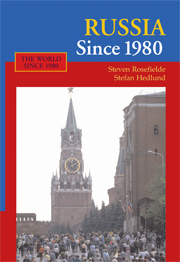Book contents
- Frontmatter
- Contents
- List of Figures, Tables, and Boxes
- Acronyms
- Timeline
- Preface
- Acknowledgments
- Introduction
- PART I RUSSIA BEFORE 1980
- 1 Muscovy and the West
- 2 Soviet Reform Communism
- PART II GORBACHEV
- PART III YELTSIN
- PART IV PUTIN
- PART V ADVANCE AND RETREAT
- PART VI PROSPECTS
- Conclusion
- Glossary
- Bibliography
- Index
- References
2 - Soviet Reform Communism
Published online by Cambridge University Press: 05 June 2012
- Frontmatter
- Contents
- List of Figures, Tables, and Boxes
- Acronyms
- Timeline
- Preface
- Acknowledgments
- Introduction
- PART I RUSSIA BEFORE 1980
- 1 Muscovy and the West
- 2 Soviet Reform Communism
- PART II GORBACHEV
- PART III YELTSIN
- PART IV PUTIN
- PART V ADVANCE AND RETREAT
- PART VI PROSPECTS
- Conclusion
- Glossary
- Bibliography
- Index
- References
Summary
The Soviet Union was a Muscovite authoritarian martial police state ruled by the Bolshevik Party under the banner of revolutionary Marxism. It claimed to be a proletarian democracy (leaders heeded the workers' will), committed to eradicating economic and social injustice, and the creation of a tranquil communist paradise where everyone harmoniously fulfilled his or her full human potential. The writings and actions of important Bolsheviks convincingly demonstrated that most were enthralled by Leninist liberationism, while rationalizing Soviet despotic deeds. Cynicism gradually eroded Bolshevik zealotry, buffeted by the traumas of War Communism, collectivization, industrialization, repression, terror, Gulag, forced labor, World War II, Soviet imperialism, and the bleakness of postwar reality, but Russian intellectuals remained wedded to Marxist ideology. Most were convinced Leninists until Mikhail Gorbachev shattered their faith. The Soviet intelligentsia, like its western brethren, acknowledged some of the regime's warts but believed that communism would evolve progressively. Until that fine day, it thought the dictatorship of the proletariat (Communist Party) should dedicate itself to proving the merit of Soviet economic planning, promoting the liberation of oppressed peoples everywhere (except in the USSR), and peacefully fostering postcapitalist globalization.
Western attitudes were more diverse. Some were swept off their feet by Marxist revolutionary rhetoric, while others, focusing on deeds, were swayed by the Bolsheviks' suppression of political opposition; subordination of independent trade unions to communist domination; criminalization of private property, business, and entrepreneurship; secret police repression of civil liberties; terror, Gulag, and forced labor; fomenting of global class war; promotion of communist insurrections in Europe, Asia, and the Third World; and proxy wars, military expansionism, arms racing, and imperialism.
- Type
- Chapter
- Information
- Russia Since 1980 , pp. 20 - 34Publisher: Cambridge University PressPrint publication year: 2008



